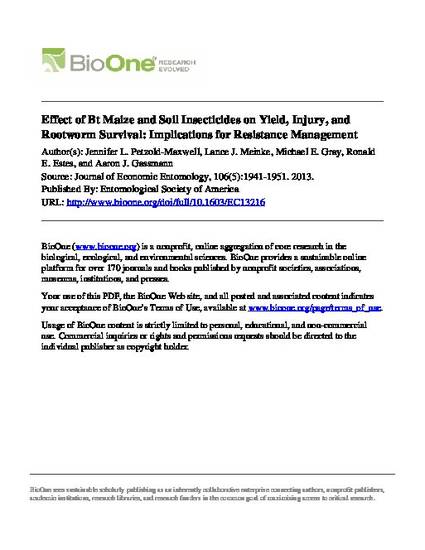
A 2-yr field experiment was conducted to determine the effects on Diabrotica spp. (Coleoptera: Chrysomelidae) of an insecticidal seed treatment (Poncho 1250, (AI) /clothianidin) and a granular insecticide (Aztec 2.1G, (AI)/tebupirimphos and cyfluthrin) alone and in combination with maize producing the insectidical toxin Cry3Bb1 derived from the bacterium Bacillus thuringiensis (Bt). Yields for Bt maize plots were significantly greater than for non-Bt maize; however, insecticides did not significantly affect yield. Insecticides significantly decreased root injury in non-Bt maize plots, but there were no significant differences in root injury between Bt maize with or without either insecticide. Maize producing the Bt toxin Cry3Bb1 and the soil-applied insecticide Aztec significantly decreased survival of western corn rootworm (Diabrotica virgifera virgifera LeConte), while only Bt maize significantly decreased survival of the northern corn rootworm (Diabrotica barberi Smith & Lawrence). For both species, Bt maize and each of the insecticides delayed emergence. In the absence of density-dependent mortality, Bt maize imposed 71 and 80% reduction in survival on the western corn rootworm and the northern corn rootworm, respectively. The data from this study do not support combining insecticide with Bt maize because the addition of insecticide did not increase yield or reduce root injury for Bt maize, and the level of rootworm mortality achieved with conventional insecticide was likely too low to delay the evolution of Bt resistance. In addition, delays in emergence from Bt maize combined with insecticides could promote assortative mating among Bt-selected individuals, which may hasten resistance evolution.
Available at: http://works.bepress.com/aaron_gassmann/43/

This article is from Journal of Economic Entomology 106 (2013): 1941, doi:10.1603/EC13216. Posted with permission.